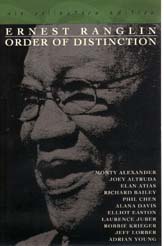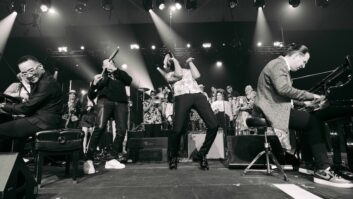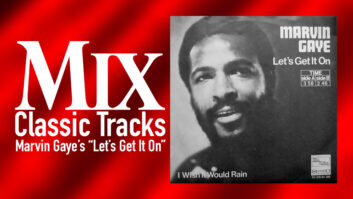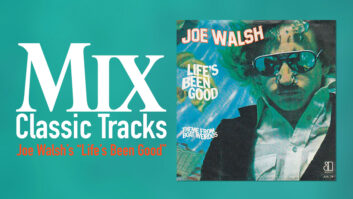
Ernest Ranglin may well be, as someone in this intimate concert and documentary DVD suggests, “The greatest guitarist you’ve never heard of.” The spry 75-year-old Jamaican was one of the fathers of ska in the mid-’60s, played with Jimmy Cliff in the years immediately following the groundbreaking success of the reggae film The Harder They Come, did sessions with the earliest version of The Wailers, but never abandoned his first and greatest love—jazz. This DVD is both a fitting tribute to his long and important career, and a marvelous showcase for his undiminished skills and passion for playing.
At the heart of the DVD is an in-studio concert featuring Ranglin (playing a couple of beautiful electric hollow-body guitars) and a fantastic core band comprising the brilliant pianist Monty Alexander—another product of Jamaica, 12 years Ranglin’s junior, equally underrated—bassist Phil Chen, drummer Richard Bailey and rhythm guitarist Joey Altruda. Then, on several songs, various guests flesh out the lineup: guitarists Robbie Krieger of The Doors, Elliot Easton of The Cars and session ace/acoustic whiz Laurence Juber; keyboardist Jeff Lorber; singers Alana Davis and Elan Atias; and No Doubt drummer Adrian Young. The music is beautifully shot (Yon Thomas was director of photography; co-producer Mark Waldrep edited it) and the audio is superb (recording was by Dominic Robelotto; mixing in the different high-res and CD formats by Robelotto, Waldren and Neil Case). You can really see and hear the remarkable interaction of the players, how one soloist will hand off the reins after he’s done, or follow them as they play call-and-response lines. Ranglin is a marvel: Though tonally he’s in the mellow, warm Wes Montgomery school of jazz guitarists, he often surprises with fast, dexterous runs that threaten to spin out of control before (usually) settling back into lyrical extrapolations on the song’s melody. That’s not too surprising, considering his earliest influences were bebop kings Dizzy Gillespie and Charlie Parker, whom he still idolizes. There’s nothing here that ventures into the sometimes chaotic regions that those musicians explored—this is mostly very measured, even-keeled music—but you can definitely hear flashes of them in some of the choices he makes in his solos.
The story of Ranglin’s career is told in brief documentary passages (directed by Christoffer Salzgebber) preceding each song. We learn of his upbringing in rural Jamaica, where he taught himself guitar by ear from listening to American jazz records. In addition to playing jazz and standards, he mastered mambo and other Caribbean dance music in resort hotels and any other place he could find work. He and others describe how ska developed naturally from a number of American R&B influences, including Louis Jordan, Louis Prima and, most prominently, Fats Domino and other leading lights of New Orleans music in the early ’60s. Ranglin and other pioneers—who plied their trade on seminal sessions by The Skatalites and others at Studio One in Kingston—“invented” ska by putting the emphasis on the “off” beat. It took the island by storm almost immediately and, of course, led to the development of rock-steady and reggae over the next several years. In 1964, Chris Blackwell, an Englishman living in Jamaica (who started Island Records there in 1961), brought Ranglin to London for what turned out to be a triumphant and prolonged residency at Ronnie Scott’s jazz club. While in England, he cut a poppy ska song called “My Boy Lollipop” with a Jamaican singer named Millie Small (and several British musicians), and the song became an international sensation, touching off a ska craze, particularly in Britain (where it has ebbed and flowed ever since), and launching Blackwell’s illustrious career. (Blackwell and Jimmy Cliff are among the “talking heads” in the documentary portion of the DVD.) There’s a nice version of “My Boy Lollipop” here, with Alana Davis singing, that pays tribute to the song’s ska roots but also updates it with Ranglin’s favored jazzy approach.
In fact, you can say that about pretty much all the songs performed on this DVD, some of which have their roots in reggae, but are mostly treated like jazz tunes, even if the underlying beat retains an island feel. A few songs are familiar: the gorgeous Jimmy Cliff ballad “Many Rivers to Cross” benefits from some outstanding Telecaster work by Elliot Easton—who knew listening to the electronics-heavy Cars all these years they had such a soulful axe man? (Alana Davis also shines on that track.) “Hurts to Be Alone,” with Elan Atias singing, was an early Wailers hit. “Grandfather Clock” is credited to Ranglin here, but isn’t it an ageless folk song covered by many artists through the years? I guess it’s his arrangement, at least. The other tunes, instrumentals all, were new to me, and all give Ranglin and his band mates plenty of room to blow, so to speak. Two of the other guests should be singled out, too. Jeff Lorber, playing a strap-on electronic Roland keyboard, lays down some amazing “B-3” on “Spur Tree.” Laurence Juber’s acoustic guitar blends so nicely with Ranglin’s tone on “Ranchin.” And Adrian Young brings a some refreshing No Doubt spunk to the skins on “Ball of Fire.”
The mood is relaxed and extremely casual throughout, but these guys are hardly lazy—they find the pocket effortlessly and then embroider each song with golden thread; lovely stuff. And Ranglin is a real treasure: Warm, smiley, self-effacing but just bursting with musical ideas. It’s nice to see this unsung hero get his due.
The DVD also comes with an accompanying audio CD of the sessions—a great deal for sure!







